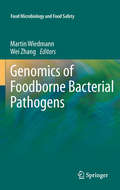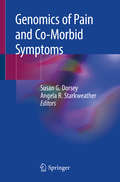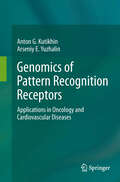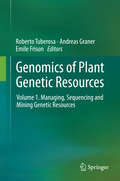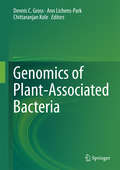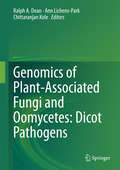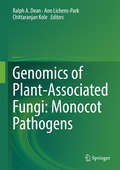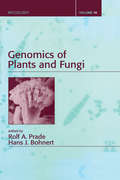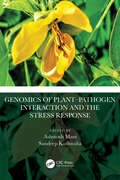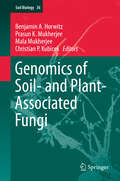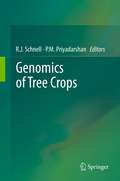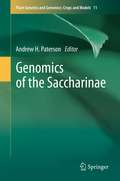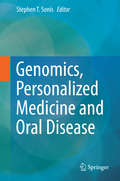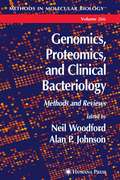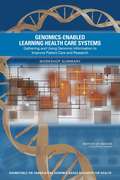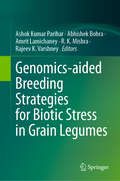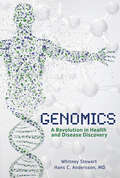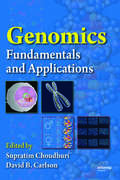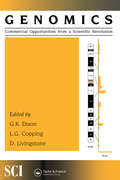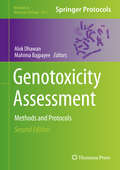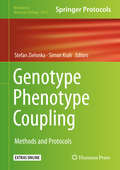- Table View
- List View
Genomics of Crucifer's Host- Pathosystem
by Prabhu Dayal Meena Naresh K. Mehta Govind Singh SaharanThe book deals with latest research achievements of Brassica scientists using omics approaches in understanding host-pathogen interaction, molecular detection, identification, and functional characterization of effectors/genes including pathogenomics and biometabolomics. Genomics of host-pathogen interaction is a source of information for the teachers, students, researchers, and policy makers to foster success in enhancing the Brassica production and productivity through the development of improved disease-resistant varieties with the use of omics technologies. It is a base and sound plate form for managing biological stresses of Brassica at global level. The book covers up-to-date information on genomics of host-pathogen interaction, pathogenomics of crucifers’ pathogen, and biometabolomics of host pathosystem supplemented with ample photographs, illustrations, and figures which make it stimulating, effective, and easy to comprehend for readers, researchers, biology students, teachers, and policy makers.
Genomics of Crucifer’s Host-Resistance
by Govind Singh Saharan Prabhu Dayal Meena Naresh K. MehtaThe book presents comprehensive information on fundamental, and applied knowledge for developing varieties resistant individually as well as to all the major pathogens of crucifers, such as Albugo, Alternaria, Erysiphe, Hyaloperonospora, Plasmodiophora, Leptosphaeria, Sclerotinia, Turnip mosaic virus, Verticillium, and Xanthomonas through the use of latest biotechnological approaches including identification of R genes and their incorporation into agronomically superior varieties. The chapters include the information’s viz., principles of host resistance, identification of R-genes sources, inheritance of disease resistance, host resistance signaling network system to multiple stresses. The book also covers transfer of disease resistance, and management of disease resistance. Standardized, reproducible techniques are also included for the researchers of cruciferous crops for developing resistant cultivars. The book deals with the gaps in understanding, knowledge of genomics, and offers suggestions for future research priorities in order to initiate the advance research on disease resistance. This book is immensely useful to the researchers especially Brassica breeders, teachers, extension specialists, students, industrialists, farmers, and all others who are interested to grow healthy, and profitable cruciferous crops all over the world.
Genomics of Foodborne Bacterial Pathogens
by Wei Zhang Martin WiedmannFoodborne illnesses caused by various bacterial, viral, and fungal pathogens lead to a high number of morbidity and mortality in the U.S. and throughout the world. Recent advances in microbial genomics have significantly improved our understanding of the physiology, evolution, ecology, epidemiology, and pathogenesis of different foodborne pathogens. This book focuses on the genomics of foodborne bacterial pathogens. It begins with a brief overview of the recent advances in microbial genomics and the impact of genomics on food safety research. Then, eight chapters follow that elaborate some in-depth reviews on the genomics of several common foodborne bacterial pathogens including Bacillus, Campylobacter, Clostridium, Escherichia coli, Listeria, Salmonella, Staphylococcus, and Vibrio. Finally, the last four chapters focus on some current genomic, transcriptomic, and proteomic technologies and their applications in studying the epidemiology, evolution, and pathogenesis of foodborne bacterial pathogens. Genomics of Foodborne Bacterial Pathogens can be used as a reference by scientists and professionals in academia, government, and industry who are interested in understanding microbial genomics and using genomics tools to study foodborne bacterial pathogens. This book can also be used as a textbook for instructors and professors who teach food microbiology or microbial genomics-related courses at the post-graduate level.
Genomics of Pain and Co-Morbid Symptoms
by Susan G. Dorsey Angela R. StarkweatherThis book provides an overview of the field of pain genomics and the genomics of related, or co-occuring, symptoms, the current state-of-the-science, and challenges that remain. It brings differing views in the field together and provides examples of translational science from using cellular and rodent models to human clinical trials. This book's structure leads the reader through the physiology of pain and genomics into how pain is studied, mechanisms of acute and chronic pain, various protocols that are used throughout the field along with the pros/cons of the current methods used, and project into the future of pain genomics. This work is intended for classroom teaching, for nurses, for novice researchers in symptom science and pain research as well as students and postdoctoral fellows.
Genomics of Pattern Recognition Receptors: Applications in Oncology and Cardiovascular Diseases
by Anton G. Kutikhin Arseniy E. YuzhalinThis book offers comprehensive information on the polymorphisms of genes encoding pattern recognition receptors (PRRs). Following a short description of the general role of PRRs in the immune system, the structure and function of Toll-like and NOD-like receptors are examined in detail. The main focus is on the role of inherited variation in PRRs and their correlation to cancer and cardiovascular diseases. A review of all epidemiological investigations is included, and a concept of genomic risk markers for the prevention of various diseases is also discussed.
Genomics of Plant Genetic Resources
by Roberto Tuberosa Andreas Graner Emile FrisonOur lives and well being intimately depend on the exploitation of the plant genetic resources available to our breeding programs. Therefore, more extensive exploration and effective exploitation of plant genetic resources are essential prerequisites for the release of improved cultivars. Accordingly, the remarkable progress in genomics approaches and more recently in sequencing and bioinformatics offers unprecedented opportunities for mining germplasm collections, mapping and cloning loci of interest, identifying novel alleles and deploying them for breeding purposes. This book collects 48 highly interdisciplinary articles describing how genomics improves our capacity to characterize and harness natural and artificially induced variation in order to boost crop productivity and provide consumers with high-quality food. This book will be an invaluable reference for all those interested in managing, mining and harnessing the genetic richness of plant genetic resources.
Genomics of Plant-Associated Bacteria
by Chittaranjan Kole Dennis C. Gross Ann Lichens-ParkThis book describes how genomics has revolutionized our scientific understanding of agriculturally important plant-associated bacteria. Each chapter focuses on the genomics of particular bacteria: the first described plant pathogen, Erwinia amylovora; phytoplasmas lacking cell walls; fastidious, phloem-restricted liberibacters; Pseudomonas syringae, which is a genetically tractable model system; Xanthomonas citri, which causes a disease that can devastate citrus crops and Pseudomonas fluorescens, which can protect plants from diseases. Topics considered in this volume include the importance of horizontal gene transfer in originating new bacterial strains and species and advances in transcriptomics that allow us to describe the complex regulatory networks critical to plant-microbe interactions. The availability of the Xanthomonas oryzae genome has led to new technologies in genome editing, which will revolutionize approaches to genetic engineering, even in eukaryotes. The contributions show how genomics has greatly accelerated progress toward understanding the biology of these bacteria and how that understanding can be translated into novel crop protection methods.
Genomics of Plant-Associated Fungi and Oomycetes: Dicot Pathogens
by Chittaranjan Kole Ann Lichens-Park Ralph A. DeanThis book describes how genomics has revolutionized our understanding of agriculturally important plant-associated fungi and oomycetes. It illustrates some fundamental discoveries about these eukaryotic microbes with regard to the overall structure of their genomes, their lifestyles and the molecular mechanisms that form the basis of their interactions with plants. Genomics has provided new insights into fungal lifestyles and led to practical advances in plant breeding and crop protection, such as predictions about the spread and evolution of new pathogens. This volume focuses on fungi and oomycetes that are typical dicot plant pathogens and includes: Sclerotinia sclerotiorum, Botrytis cinerea, Alternaria sp. ,Verticillium alfalfae and Verticillium dahliae, Fusarium oxysporum, Phytophthora capsici, Phytophthora sojae, Phytophthora ramorum, Phytophthora infestans, Hyaloperonospora arabidopsidis.
Genomics of Plant-Associated Fungi: Monocot Pathogens
by Chittaranjan Kole Ann Lichens-Park Ralph A. DeanThis book describes how genomics has revolutionized our understanding of agriculturally important plant-associated fungi. It illustrates some fundamental discoveries about these eukaryotic microbes with regard to the overall structure of their genomes, their lifestyles and the molecular mechanisms that form the basis of their interactions with plants. Genomics has provided new insights into fungal lifestyles and led to practical advances in plant breeding and crop protection, such as predictions about the spread and evolution of new pathogens. This volume focuses on fungi that are important cereal and other monocot plant pathogens and includes: Pyrenophora tritici-repentis, Cochliobolus sp. , Colletotrichum sp. , Fusarium graminearum, Mycosphaerella graminicola and Mycosphaerella fijiensis, Magnaporthe oryzae, Blumeria graminis and Puccinia graminis.
Genomics of Plants and Fungi
by Hans J. Bohnert Rolf A. PradeThis volume provides technical insight on how genomics-oriented studies may be used to bring new understanding to established models of fungal development. The book helps to assess and solve problems associated with multiple copies of genes and proteins with seemingly identical functions and depicts various industrial applications. To bridge the in
Genomics of Plant–Pathogen Interaction and the Stress Response
by Ashutosh Mani Sandeep KushwahaPlants are an indispensable part of human and animal lives for nutrition and health. But pests, diseases and abiotic stress adversely affect crop yield, which ultimately places significant pressure on society to provide food to an increasing population. Moreover, it also encourages increased chemical/pesticide usage on crops, which we see in the biomagnification of toxic and hazardous compounds polluting water bodies, soil and the environment. This condition will continue to worsen in the future due to the resistance-acquiring ability of pathogens against plant defense and chemical treatments. In addition, environmental disturbances and consumer health issues are being reported more promptly than before due to intensive use of pesticides in food production. Plant diseases affect our daily lives, as the use of insecticides and pesticides has become part of our food chain. As a result, precise disease diagnosis and management is crucial in order to avoid huge losses in plant production and related commodities. Accurate detection, precise diagnosis and proper management can play a significant role in keeping plants free from pathogens. In this book, scientists, researchers and scholars share their research knowledge, offering a valuable resource for understanding plant diseases, pathogen interaction and responses to stress through an omics perspective, contributing to further advancements in the field Diseases in plants may be caused by various factors, such as viruses, bacteria, fungi and abiotic stress. Disease causes low crop yield, production of poor-quality fruits and grains, and deficiency of nutrients, which have a direct impact on human and animal health. A genomics-based approach can be applied to disease diagnosis; disease outbreak; evolution of plant and pathogen genome for disease outbreak in relation to climate change; and development of long-term strategies for plant health and defense. This book presents an overview of omics technologies and approaches used to understand: 1) the relation between plants and their environment in terms of diseases 2) responses to abiotic stress 3) the genomics of plant–pathogen interaction 4) herbicide-resistance mechanisms 5) the epigenetics of plant–pathogen interaction 6) gene regulation during abiotic stress response 7) the oxidative stress response
Genomics of Soil- and Plant-Associated Fungi
by Christian P. Kubicek Mala Mukherjee Prasun K. Mukherjee Benjamin A. HorwitzThis volume addresses the similarities and also the differences in the genomes of soil saprophytes, symbionts, and plant pathogens by using examples of fungal species to illustrate particular principles. It analyzes how the specific interactions with the hosts and the influence of the environment may have shaped genome evolution. The relevance of fungal genetic research and biotechnological applications is shown for areas such as plant pathogenesis, biomass degradation, litter decomposition, nitrogen assimilation, antibiotic production, mycoparasitism, energy, ecology, and also for soil fungi turning to human pathogens. In addition to the model organisms Neurospora and Aspergillus, the following species are covered providing a view of pathogens and mutualists: Trichoderma, Fusarium oxysporum, Cochliobolus heterostrophus, Penicillium chrysogenum, Rhizopus oryzae, Podospora anserina, Agaricomycetes, Archaeorhizomycetes and Magnaporthaceae. Ecology and potential applications have guided the choice of fungal genes to be studied and it will be fascinating to follow the trends of future sequencing projects.
Genomics of Tree Crops
by P. M. Priyadarshan R. J. SchnellTrees that are indispensably supportive to human life pose a formidable challenge to breed them to suit to human needs. From soft drinks to breweries to beverages to oil to tires, the value added products from trees give a spectrum of products to human kind. While attempts to tap these resources through conventional breeding are underway, the quick and elegant way of manipulating the genetic systems at the genome level is an essential chapter of modern science. Books featuring genomics of tree crops are few, and genomics is such a science that changes rapidly. Genomics of Tree Crops is an earnest attempt towards compiling genomics of tree crops. Plant genomics has made monumental strides in the last decade providing insights into intra-genomic phenomena such as heterosis, epistasis, pleiotropy and other interactions between loci and alleles within the genome. In contrast, the investigation of the roles and functions of single genes is a primary focus of molecular biology and is a common topic of modern genetic research. A genome is the sum total of all of an individual organism's genes. Thus, genomics is the study of all the genes of a cell, or tissue, at the DNA (genotype), mRNA (transcriptome), or protein (proteome) levels. The complete sequencing of the three billion base pair human genome with 25,000 genes identified and the invention of DNA microarrays ushered in a new era in the science of genomics leading to explosive advancements in oncology diagnostics. This impetus into the genomics era lead the way toward advances in plant genomics which started with Arabidopsis thaliana and went through an array of crops such as rice, maize, papaya, various cereals and legumes, with pigeon pea added to the list towards the end of 2011. Trees, on the other hand, are the least attended taxa with regard to genomic research. Some of the areas that attained attention of the scientists are: DNA sequencing, bioinformatics, genomics of flowering, gene flow, spatial structure, local adaptation and assisted migration in trees, transformation of fruit trees, genomics of tropical and temperate fruit trees, genomics of Hevea rubber, genomics of papaya and genomics of palms. Genomics of Tree Crops compiles this information with chapters authored by experts on these crops.
Genomics of the Saccharinae
by Andrew H. PatersonThe Saccharinae clade of the Poaceae (grass) family of flowering plants includes several important crops with a rich history of contributions to humanity and the promise of still-greater contributions, as a result of some of the highest biomass productivity levels known, resilience to drought and other environmental challenges that are likely to increase, amenability to production systems that may mitigate or even reverse losses of ecological capital such as topsoil erosion, and the recent blossoming of sorghum as a botanical and genomic model for the clade. In Genomics of the Saccharinae, advances of the past decade and earlier are summarized and synthesized to elucidate the current state of knowledge of the structure, function, and evolution of the Sorghum, Saccharum, and Miscanthus genera, and progress in the application of this knowledge to crop improvement. As a backdrop, it is important to understand the naturally occurring diversity in each genus, its organization and distribution, and its evolutionary history. Genomic tools and methods for Saccharinae biology and improvement have improved dramatically in the past few years - a detailed summary of these tools and their applications is a central element of this book. Application of genomic tools to priorities in crop improvement, including understanding and manipulating plant growth and development, composition, and defense, as well as increasing the quality and productivity of seed/grain, sugar, biomass, and other value-added products under a range of conditions and inputs, are addressed. In particular, as the first native African crop to emerge as a genomic model, sorghum offers an excellent case study of challenges and opportunities in linking new advances in biosciences to solving some of Africa's major agricultural problems. Several members of the clade, exemplified by Sorghum halepense (Johnsongrass) offer insights into weediness and invasion biology. The first sequence for a member of the clade, sorghum, as well as progress and challenges toward sequencing of additional members and the new opportunities that this will create, are also explored. Indeed, the very complexities that have hindered study of some clade members also offer intriguing opportunities to gain insight into fundamental questions such as roles of polyploidy in agricultural productivity and post-polyploidy evolution.
Genomics, Personalized Medicine and Oral Disease
by Dmd Stephen T. Sonis DmscThe objective of this book is to catalyze the application of genomics to the diagnosis and treatment of oral diseases by comprehensively presenting focused discussions on the current state of knowledge. The first section book provides basic information about genetics, genomics and personalized medicine and the informatical methods available to apply and organize genetic data so that it has clinical relevance. Recognizing the genetic robustness of the oral cavity, the introductory section includes chapters on the oral micro biome and host genomics and response to infectious agents. The next two sections contain chapters which describe the genomics of specific oral diseases and conditions, including the genetic basis for mechanism and risk of treatment toxicities associated with cancer therapy and bisphosphonates. Four chapters focus on gene-based therapies and the pharmacogenomics applied to oral disease. The final chapter presents a provocative summary which describes a comprehensive vision of the melding of genomics to personalized medicine and the potential actionable outcomes that will likely affect clinical practice in the upcoming years.
Genomics, Proteomics, and Clinical Bacteriology
by Neil Woodford Alan P. JohnsonAn accessible introduction to how genomics has and will provide novel methods for bacterial investigation and advance our understanding and knowledge of bacterial pathogenicity. The authors critically evaluate the applications of genomics to diagnostic bacteriology, highlighting both current and likely future uses, describing real-time PCR methods, and outlining the promise of microarrays in clinical bacteriology. Their discussion examines in detail genomic approaches to antibacterial discovery, the nature of pathogenicity, the discovery of new pathogens, the exploration of the concept of clonality in bacteria, and bacterial taxonomics.
Genomics, Proteomics, and Metabolomics: Stem Cells Monitoring in Regenerative Medicine (Stem Cell Biology and Regenerative Medicine)
by Babak ArjmandThis book provides thorough coverage of high-throughput OMICs technologies for the monitoring of stem cells and regenerative medicine. Specific topics covered include the genomics, proteomics, and metabolomics aspects of regenerative medicine, metabolic profiling of mesenchymal stem cells, genome profiling of mesenchymal stem cells, OMICs monitoring of stem cell-derived exosomes, stem cell proteomics, lipidomics, OMICs profiling of cancer (stem) cells, and finally ethical considerations of OMICs-based investigations. Chapters are authored by world-renowned scientists who have valuable expertise in the field of OMICs and regenerative medicine.Genomics, Proteomics, and Metabolomics: Stem Cells Monitoring in Regenerative Medicine, part of Springer’s Stem Cell Biology and Regenerative Medicine series, is essential reading for researchers, clinicians, biologists, biochemists, and pharmaceutical experts conducting research in the fields of stem cell biology, molecular aspects of stem cell research, tissue engineering, regenerative medicine, cellular therapy, OMICs, bioinformatics, and ethics.
Genomics-Enabled Learning Health Care Systems: Workshop Summary
by Sarah H. BeachyThe inclusion of genomic data in a knowledge-generating health care system infrastructure is one promising way to harness the full potential of that information to provide better patient care. In such a system, clinical practice and research influence each other with the goal of improving the efficiency and effectiveness of disease prevention, diagnosis, and treatment. To examine pragmatic approaches to incorporating genomics in learning health care systems, the Institute of Medicine Roundtable on Translating Genomic-Based Research for Health hosted a workshop which convened a variety of stakeholder groups, including commercial developers, health information technology professionals, clinical providers, academic researchers, patient groups, and government and health system representatives, to present their perspectives and participate in discussions on maximizing the value that can be obtained from genomic information. The workshop examined how a variety of systems are capturing and making use of genomic data to generate knowledge for advancing health care in the 21st century. It also sought to evaluate the challenges, opportunities, and best practices for capturing or using genomic information in knowledge-generating health care systems. "Genomics-Enabled Learning Health Care Systems" summarizes the presentations and discussion of the workshop.
Genomics-Enabled Learning Health Care Systems: Workshop Summary
by Sarah H. BeachyThe inclusion of genomic data in a knowledge-generating health care system infrastructure is one promising way to harness the full potential of that information to provide better patient care. In such a system, clinical practice and research influence each other with the goal of improving the efficiency and effectiveness of disease prevention, diagnosis, and treatment. To examine pragmatic approaches to incorporating genomics in learning health care systems, the Institute of Medicine Roundtable on Translating Genomic-Based Research for Health hosted a workshop which convened a variety of stakeholder groups, including commercial developers, health information technology professionals, clinical providers, academic researchers, patient groups, and government and health system representatives, to present their perspectives and participate in discussions on maximizing the value that can be obtained from genomic information. The workshop examined how a variety of systems are capturing and making use of genomic data to generate knowledge for advancing health care in the 21st century. It also sought to evaluate the challenges, opportunities, and best practices for capturing or using genomic information in knowledge-generating health care systems. Genomics-Enabled Learning Health Care Systems summarizes the presentations and discussion of the workshop.
Genomics-aided Breeding Strategies for Biotic Stress in Grain Legumes
by Rajeev K. Varshney R. K. Mishra Abhishek Bohra Ashok Kumar Parihar Amrit LamichaneyThis contributed volume explores the latest breakthroughs in genetic and genomic resources for enhancing biotic stress responses in grain legumes – including minor ones. It covers the advances made to date, including gene identification, transcriptomics, proteomics, transgenics, genome editing, genomic selection, epigenetic breeding, and speed breeding related to different biotic stresses. Authored by crop-specific experts, the chapters in this book are essential resources for those directly involved in improving grain legume crops. Legumes play a vital role in ensuring food and nutritional security, enhancing soil quality, and promoting environmental sustainability. Rich in protein, they are essential in preventing hunger and malnutrition while adding to dietary diversity. However, as these crops are commonly grown in marginal lands with poor inputs, they are highly susceptible to biotic stresses such as diseases and pests, which can cause significant yield losses. This book consolidates all available knowledge about genetic and genomic aspects of biotic stress responses in various grain legumes. It is a must-have resource for all stakeholders involved in grain legume improvement. Whether you are a breeder, pathologist, biotechnologist, seed production specialist, market manager, graduate or post-graduate student, or any other industry professional, this book serves as an excellent guide to help you stay at the forefront of grain legume improvement.
Genomics: A Revolution in Health and Disease Discovery
by Whitney Stewart Hans C. AnderssonOver the past 50 years, scientists have made incredible progress in the application of genetic research to human health care and disease treatment. Innovative tools and techniques, including gene therapy and CRISPR-Cas9 editing, can treat inherited disorders that were previously untreatable, or prevent them from happening in the first place. You can take a DNA test to learn where your ancestors are from. Police officers can use genetic evidence to identify criminals—or innocents. And some doctors are using new medical techniques for unprecedented procedures. Genomics: A Revolution in Health and Disease Discovery delves into the history, science, and ethics behind recent breakthroughs in genetic research. Authors Whitney Stewart and Hans Andersson, MD, present fascinating case studies that show how real people have benefitted from genetic research. Though the genome remains full of mysteries, researchers and doctors are working hard to uncover its secrets and find the best ways to treat patients and cure diseases. The discoveries to come will inform how we target disease treatment, how we understand our health, and how we define our very identities.
Genomics: Fundamentals and Applications
by Supratim Choudhuri David B. CarlsonThis unique new text delivers a solid foundation for understanding the role of genomics in human health and in advances that promise to help improve the quality of human life. Unlike other works that focus mainly on toxicogenomic techniques, Genomics presents a thorough overview of the field in four major sections: 1) fundamentals of genes and geno
Genomics: commercial opportunities from a scientific revolution
by L. G. Copping G. K. Dixon D. LivingstoneThis title covers topical and unexplored issues relating to the commercial outcome of the genetic revolution which will be of great interest to both academia and industry. The book discusses whether the availability of genome sequence information will yie
Genotoxicity Assessment: Methods and Protocols (Methods in Molecular Biology #2031)
by Mahima Bajpayee Alok DhawanThis current edition explores new tests for genotoxicity testing, along with other well-known techniques. This will further help in our understanding of the genotoxic effects of chemicals. The book has different sections dealing with various assays for gene mutation, chromosomal abnormalities, primary DNA damage, etc. It also delves into plant models, animals and their alternates, as well as in silico approaches for genetic toxicology. Written for the highly successful Methods in Molecular Biology series, chapters include introductions to their respective topics, lists of the necessary materials and reagents, step-by-step, readily reproducible laboratory protocols, tips on troubleshooting and avoiding known pitfalls. Authoritative and up-to-date, Genotoxicity Assessment: Methods and Protocols, Second Edition serves as a highly useful and ready resource for research students and scientists working in regulatory toxicology as well as biomedical, biochemical, and pharmaceutical sciences.
Genotype Phenotype Coupling: Methods and Protocols (Methods in Molecular Biology #2070)
by Stefan Zielonka Simon KrahThis volume aims at providing state-of-the-art protocols detailing ribosome display, cDNA display, phage display, yeast surface display, and mammalian display. Chapters guide readers through methods and protocols on in vitro methods over prokaryotic display systems, lower eukaryotes, and mammalian cells. Written in the highly successful Methods in Molecular Biology series format, chapters include introductions to their respective topics, lists of all necessary materials and reagents, step-by-step, readily reproducible laboratory protocols, and key tips on troubleshooting and avoiding known pitfalls. Authoritative and cutting-edge, Genotype Phenotype Coupling aims to provide an overview of current technologies in this exciting and continuously evolving field.


